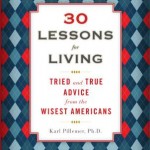 What makes or breaks a marriage? To uncover the answer to that question, I have been interviewing the individuals I believe are the true experts: older people who have been married for decades. In hundreds of discussions with America’s elders (described in my recent book), one answer is surprisingly clear.
What makes or breaks a marriage? To uncover the answer to that question, I have been interviewing the individuals I believe are the true experts: older people who have been married for decades. In hundreds of discussions with America’s elders (described in my recent book), one answer is surprisingly clear.
In looking at your marriage, they suggest you ask one key question: Can you talk with your spouse? And further: Can you talk with him or her about anything or are there “hot-spots” that are off-limits for conversation as a couple? It may work out if one partner declares a minor topic as off-limits (new phone apps, shoe sales or any interactive video game, for example). But as a rule, the elders in long marriages believe your partner simply must be someone you can talk to. Indeed, the most frequent source of “buyer’s remorse” in our respondents’ marriages was finding that a spouse just couldn’t or wouldn’t communicate.
Where is communication most important? These “experts” on marriage agreed that one thing all couples need to do — if you want to remain married as long as they have — is to learn to communicate about conflicts. More specifically, we all need to learn how to fight. I learned from the elders that fights are inevitable; it’s how we handle them that matters.
Dora is 86 years old and has been married for 67 years. When asked about the kind of advice she has for younger people about marriage, Dora’s lesson was about fighting:
Well, the only thing I can really think of is this: Just because you have a fight, it’s not the end of things. After all, there are two people living together, coming from different families, different upbringings. And if you fight, you have to recognize: “Oh, well, so what? We had a fight.” Ten minutes later you forget about it. As you get older, it becomes five minutes. Today people are, “Oh I had a fight,” and they act like it was the end of the world. You just have to move on. There’s at least two a week in this house!
So we have to get used to fights. Maybe that word is too strong for some couples, but even those who don’t “fight” have disagreements. And it is in communication around differences of opinion that the secret to a long marriage lies. You’ve just heard someone in a great marriage that has lasted 67 years tell you cheerfully that she and her husband fight twice a week. It’s not the fighting — it’s how you deal with it.
The elders proposed some creative ways of talking through disagreements before they get to the knock-down, drag-out level. Here are four suggestions for how to communicate when things get tense in your relationship.
Tip 1: If you are having trouble discussing something, get out of the house.
Gary, 75, suggests that a change of scene can help you communicate about a disagreement.
When you’re in your own home, you’re in the same atmosphere where the problems are going on. So you should go somewhere where you can talk — maybe it would be in the park, a restaurant or somewhere else. We’ve done that when we needed to. I’m not sure why that works better, but it does.
Tip 2: Find a way to blow off steam, and then engage with your partner.
Antoinette, 81, found that writing helped defuse conflicts and increased her ability to discuss them.
When I became terribly upset, I would sit down and write long letters to my husband, put them aside, read them the next day — and then throw them away. I think the big thing is to vent these things out of yourself, and you can do that in many ways. I found that writing helped.
Tip 3: Watch out for teasing.
Benjamin, 72, and his wife eliminated one way of relating that they found dangerous — it’s a strategy that could be used by many couples:
After we got married, we went through sort of a teasing phase, and it was getting out of hand. So we made a pact that we wouldn’t tease the other person at all, and it really helped. It can degenerate into something nasty, teasing. So we just stopped it. I may have been the worst one, the bigger tease. I’m kind of a jokester, and maybe I thought it was funny. But it digs a little too deep. And then she would probably retaliate. It certainly changes the other person’s attitude after they get teased. Looking back, that was an important moment, a turning moment point for us — to stop teasing. And it really cleared the air. It was wonderful.
Tip 4: Let your partner have his or her say.
The elders found making an effort to listen, and to clearly show your partner that you are listening, to be a major way to defuse conflict. They say it’s one of the major challenges in marriage — shutting up long enough to hear your partner’s perspective.
Here’s 82-year-old Natalie’s tip:
Before getting married, I had been single for quite a while — 27 years. I was used to running my own life. I thought I knew all the answers. When my husband would talk, instead of listening to him I would be thinking what to say… to contradict or to reinforce what I was trying to say. That is not the best thing when you communicate. You’ve really got to listen and let them have their say. When they’re done, ask, “What would you want?” or “What do you think would be the right thing we should do?” When I was in my twenties, I had all the answers. Now that I’m in my eighties, I’m not so sure my answers are always right.
April, 72, suggests “letting go.” She offers a very useful tip for deciding who should let what go:
It’s important to let some things go. You need to figure out what matters and what really doesn’t matter. There was one thing that we came to early on that really stayed with us: If we were in some sort of struggle over something, we would stop and say, “Which one of us is this more important to?” And when we could figure that out, the other one found it so much easier to let go. But we needed to consciously stop and figure it out.
So whether you call it a spat, a tiff or a disagreement, our elders say we must learn to fight fair — and it’s never too late to do so.
(Do you have marriage advice of your own? Please tell us your marriage lessons at our new site!)
 almost nothing if you had a loving family, a supportive neighborhood, and you weren’t competing with a lot of other people who had more than you did.
almost nothing if you had a loving family, a supportive neighborhood, and you weren’t competing with a lot of other people who had more than you did.





 Americans
Americans
